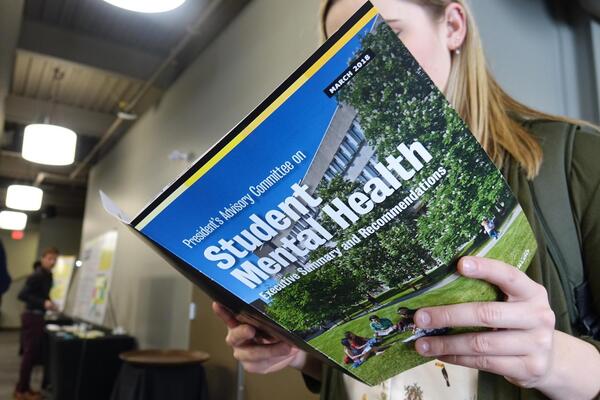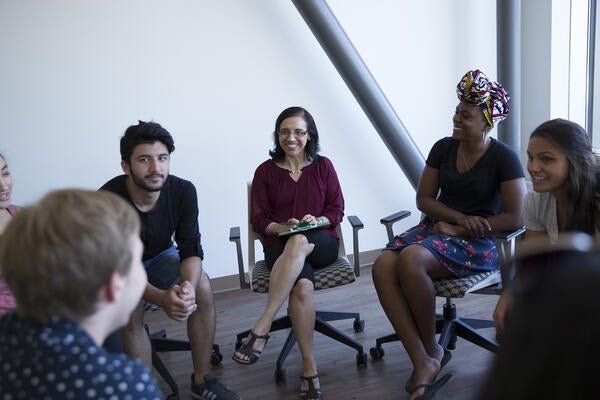
From 60 days to one
The University of Waterloo shrinks support wait times for mental health

The University of Waterloo shrinks support wait times for mental health
By Meghana Anthannagari University RelationsFor third-year student Chukwunonso J. Moneme, mental health initiatives have always been close to his heart.
“Mental health affects everybody — future artists, scientists and engineers of the world. It affects the people who are going to change the world. Post-secondary institutions should always make student wellness their top priority.”
This passion led Moneme to represent Waterloo’s undergraduate students on the University’s Committee on Student Mental Health (Co-SMH).
Moneme, along with four other student representatives on the committee, help the University make significant strides in the area of student wellness, the most recent being the reduction of mental health support wait times from 60 days to one. This was made possible by increasing support staffing and triaging a system based on urgency as well as focusing on early intervention and prevention strategies.
“Early intervention is really important because if you don’t address one issue it can lead to another, creating a snowball effect,” Chukwunonso says. “Students need to be able to recognize what mental illness looks like, discuss and address it so we can handle the issue as soon as arises.”
The PAC-SMH was created in Fall 2017 to enhance and account for the progress of mental health initiatives across campus.
After gathering information from student experience/services, mental health experts and community partners, recommendations brought forward included several themes related to campus policies and practices, mental health awareness and service improvements.
Overall, 36 recommendations were put forward by Committee members. As of October 30, 2020, two thirds of the recommendations are complete, while 25 per cent are in progress. All recommendations are expected to be implemented by April 30, 2021.
Ensuring all voices are heard
With remote learning practices taking precedent, there is an ever-increasing need for mental health support across post-secondary institutions. Walter Mittelstaedt, director of Campus Wellness says, “Students will continue to come to University struggling with mental illness, and some will develop mental illness while studying. Post-secondary institutions on their own or working in partnership with community providers need to be able to support these students to continue their studies.”
For that reason, a recommendation catered specifically toward ethnicity, sexual orientation, gender identity and ability hopes to have all backgrounds, voices and beliefs heard. It focuses on developing a cultural competency strategy regarding student mental health.
“LGBTQ, International and ethnically diverse student groups are more vulnerable than some others to social isolation and unique experiences of stress,” Mittelstaedt says. “We have an enhanced training of student wellness staff in these areas and are working in partnership with the Human Rights, Equity and Inclusion office to identify opportunities for improved mental health response for these groups.”
While preventative measures and early intervention have always been important areas of focus for the University, Waterloo has increased this knowledge gathering through campus-wide training offered to all community members.
For students by students
Student voice is crucial in creating these recommendations and implementing them appropriately. The student representatives are able to bring their first-hand experiences and perspectives to the Committee, ensuring initiatives not only work well in theory, but also in practice.
A simple, yet significant, initiative addition of the mental health resource section on the University’s Student Learn page is effective in practice.
“Students visit that website all the time, so the addition of a mental health section on Learn is really great,” Moneme says.
Beyond that, Moneme describes his excitement specifically about the implementation of the Intentional Design and Planning of Student Space recommendation, which ensures spaces being designed on campus are supportive of student mental health.
“It looks at underlying factors that we often don’t attribute to wellness — fresh air, greenery, community space — we had plant operations come in and talk about the plan,” Moneme says. “It’s great to be involved in the design process, especially as an engineering student. ‘Is there enough physical space on campus for students and is it accessible?’ is an important question to answer.”
Alongside Waterloo’s layout, campus culture also has a tremendous influence on student wellness and mental health. Moneme discusses Waterloo’s unique approach regarding failure and its contribution to a more positive campus culture.
“I find that Waterloo is more accepting of the concept of failure than other universities. We openly talk about failure and there’s less of a toxic competitive culture because of that. The University tries to support students during difficult times, and doesn’t immediately boot you out of your program, despite failures.”
To learn more about student wellness initiatives across campus and more updates visit PAC-SMH and Wellness Collaborative. Waterloo members can also contact their faculty or student representative to voice your thoughts and ideas.

Read more
Hundreds gathered to discuss recommendations to mental health initiatives.

Read more
Supporting student mental health is an ongoing journey for staff, students and faculty.

Read more
Intelligence-driven tech supports both individuals in crisis and the officers assisting them
The University of Waterloo acknowledges that much of our work takes place on the traditional territory of the Neutral, Anishinaabeg, and Haudenosaunee peoples. Our main campus is situated on the Haldimand Tract, the land granted to the Six Nations that includes six miles on each side of the Grand River. Our active work toward reconciliation takes place across our campuses through research, learning, teaching, and community building, and is co-ordinated within the Office of Indigenous Relations.